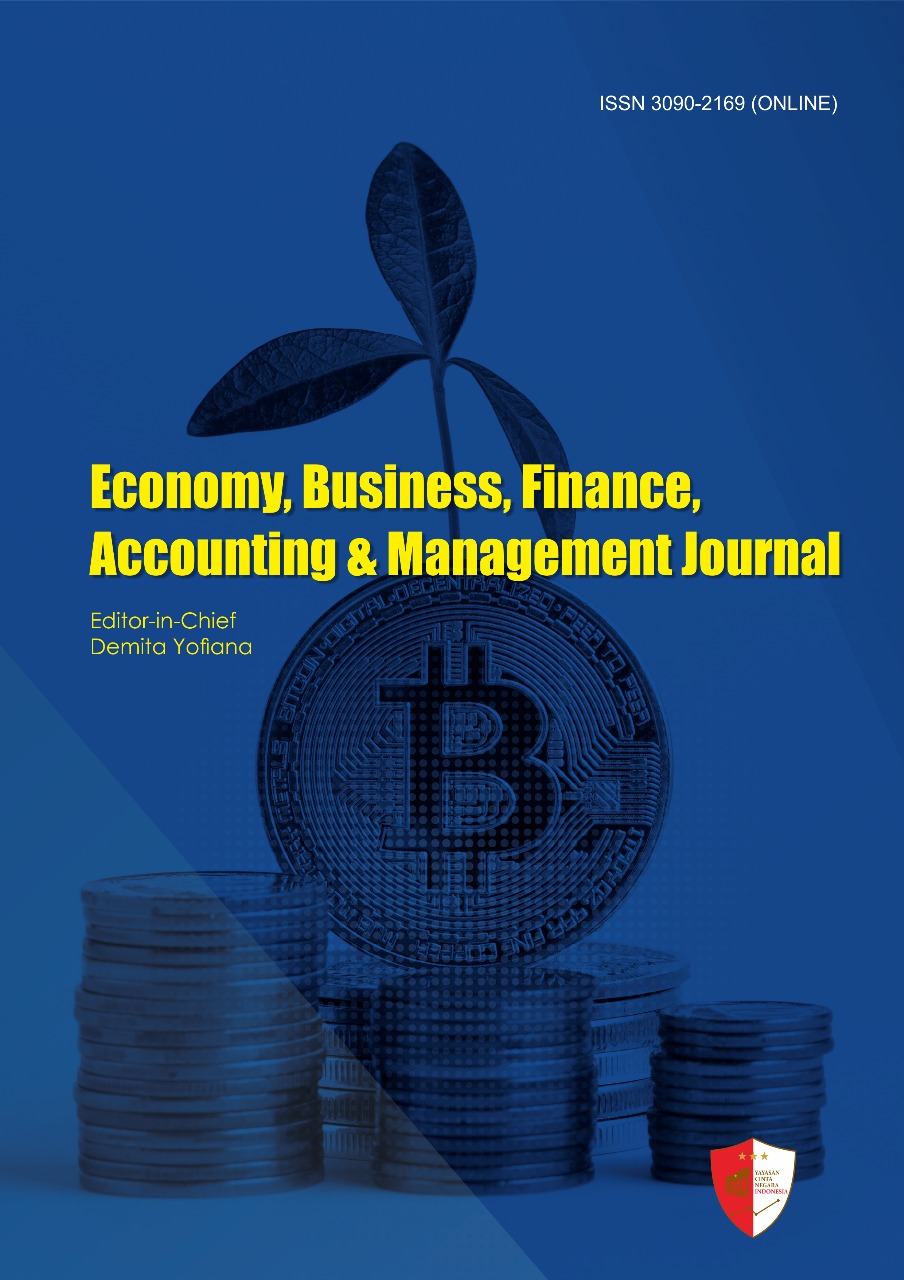Optimizing the digital economy to improve financial inclusion in Indonesia
Keywords:
Digital Economy, Digital Infrastructure, Financial Literacy, Government Policy, RegulationAbstract
This study aims to analyze the role of the digital economy in improving financial inclusion in Indonesia, as well as the challenges and opportunities associated with its implementation. Along with the rapid development of information and communication technology, the digital economy sector, particularly digital financial services or fintech, has opened access to finance for previously marginalized communities, such as those living in remote areas, MSMEs, and low-income groups. This study uses a systematic literature review approach to explore the various factors influencing the expansion of the digital economy in Indonesia, including government policies, existing regulations, and their impact on improving financial literacy. The findings show that while the digital economy has great potential to improve financial inclusion, there are significant barriers, such as inequality in internet access between urban and rural areas, regulatory challenges, and issues related to cybersecurity and personal data protection. To optimize the benefits of the digital economy, a collaborative role between the government, private sector and society is needed to overcome these barriers and develop policies that support inclusive and safe growth of the digital economy. This research provides recommendations to improve digital infrastructure, strengthen digital literacy, and create adaptive regulations to ensure that all levels of society can equally benefit from the digital economy
References
Ali, M. M., Devi, A., Furqani, H., & Hamzah, H. (2020). Islamic financial inclusion determinants in Indonesia: an ANP approach. International Journal of Islamic and Middle Eastern Finance and Management, 13(4), 727–747.
Alwahidin, N., Jufra, A., Mulu, B., & Sari, K. N. (2023). A New Economic Perspective: Understanding The Impact Of Digital Financial Inclusion On Indonesian Households Consumption. Bulletin of Monetary Economics and Banking, 26(2), 333–360.
Aniqoh, N. A. F. A. (2020). The role of digital economy to enhancing sustainable economic development. International Journal of Social Science and Business, 4(4), 519–527.
Aslam, B., Tariq, U., & Ahmad, O. (2024). Analysis of Factors that Influence the Implementation of Technological Innovation in the Indonesian Public Sector. Journal of Loomingulisus Ja Innovatsioon, 1(6), 266–276.
Aziz, A., & Nur’aisyah, I. (2021). Role Of The Financial Services Authority (OJK) To Protect The Community On Illegal Fintech Online Loan Platforms. Journal of Research in Business and Management.
Bandura, R., & Ramanujam, S. R. (2022). Developing inclusive digital payment systems. JSTOR.
Dellyana, D., Arina, N., & Fauzan, T. R. (2023). Digital Innovative Governance of the Indonesian Creative Economy: A Governmental Perspective. Sustainability, 15(23), 16234.
Dudhat, A., & Agarwal, V. (2023). Indonesia’s digital economy’s development. IAIC Transactions on Sustainable Digital Innovation (ITSDI), 4(2), 109–118.
Ediagbonya, V., & Tioluwani, C. (2023). The role of fintech in driving financial inclusion in developing and emerging markets: issues, challenges and prospects. Technological Sustainability, 2(1), 100–119.
Esquivias, M. A., Sugiharti, L., Jayanti, A. D., Purwono, R., & Sethi, N. (2020). Mobile technologies, financial inclusion and inclusive growth in East Indonesia. Journal of Telecommunications and the Digital Economy, 8(2), 123–145.
Farliana, N., Murniawaty, I., & Hardianto, H. (2023). Sustainability of the Digital Economy in Indonesia: Opportunities, Challenges and Future Development. Review of Business and Economics Studies, 11(4), 21–28.
Gulyas, O., & Kiss, G. (2023). Impact of cyber-attacks on the financial institutions. Procedia Computer Science, 219, 84–90.
Hussain, N., & Phulpoto, S. (2024). Digital literacy: Empowering individuals in the Digital Age. Assyfa Learning Journal, 2(2), 70–83.
Kanungo, R. P., & Gupta, S. (2021). Financial inclusion through digitalisation of services for well-being. Technological Forecasting and Social Change, 167, 120721.
Madan, N. (2020). A review of access to finance by micro, small and medium enterprises and digital financial services in selected Asia-Pacific least developed countries.
Ozturk, I., & Ullah, S. (2022). Does digital financial inclusion matter for economic growth and environmental sustainability in OBRI economies? An empirical analysis. Resources, Conservation and Recycling, 185, 106489.
Rahayu, S. K., Budiarti, I., Firdauas, D. W., & Onegina, V. (2023). Digitalization and informal MSME: Digital financial inclusion for MSME development in the formal economy. Journal of Eastern European and Central Asian Research (JEECAR), 10(1), 9–19.
Rumbogo, T., McCann, P., Hermes, N., & Venhorst, V. (2021). Financial inclusion and inclusive development in Indonesia. Challenges of Governance: Development and Regional Integration in Southeast Asia and ASEAN, 161–181.
Sari, Y., Nugroho, M., & Rahmiyati, N. (2023). The effect of financial knowledge, financial behavior and digital financial capabilities on financial inclusion, financial concern and performance in MSMEs in East Java. Uncertain Supply Chain Management, 11(4), 1745–1758.
Setiawan, B., Dai Phan, T., Medina, J., Wieriks, M., Nathan, R. J., & Fekete-Farkas, M. (2023). Quest for financial inclusion via digital financial services (Fintech) during COVID-19 pandemic: case study of women in Indonesia. Journal of Financial Services Marketing, 1.
Sudiantini, D., Rizky, P. P., & Hazarika, A. (2023). Digital economy and financial inclusion in reviving the national economy: A Management Strategy. Revenue Journal: Management and Entrepreneurship, 1(1), 64–75.
Wang, D., Zhou, T., & Wang, M. (2021). Information and communication technology (ICT), digital divide and urbanization: Evidence from Chinese cities. Technology in Society, 64, 101516.
Wanof, M. I. (2023). Digital technology innovation in improving financial access for low-income communities. Technology and Society Perspectives (TACIT), 1(1), 26–34.
Williams, L. D. (2021). Concepts of Digital Economy and Industry 4.0 in Intelligent and information systems. International Journal of Intelligent Networks, 2, 122–129.
Downloads
Published
Issue
Section
License
Copyright (c) 2025 Suryany samosir (Author)

This work is licensed under a Creative Commons Attribution-NonCommercial 4.0 International License.





